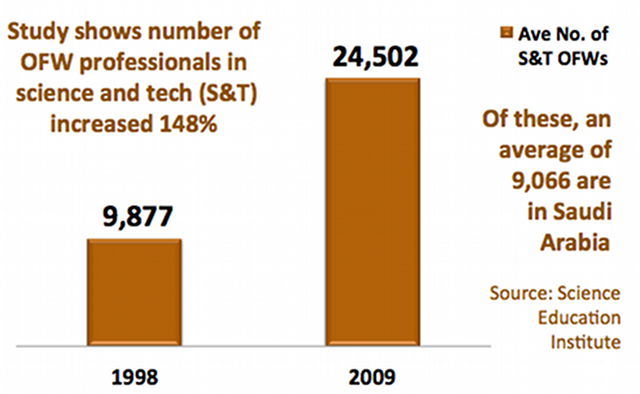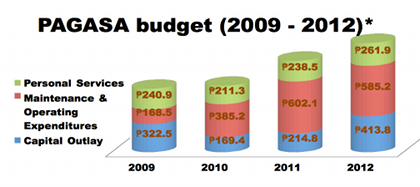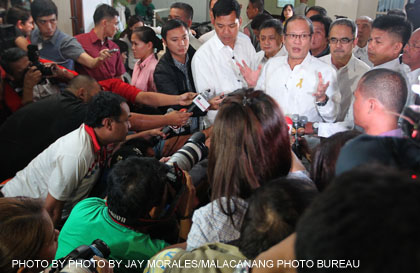SUMMARY
This is AI generated summarization, which may have errors. For context, always refer to the full article.

MANILA, Philippines – The timing couldn’t have been more appropriate.
The Philippines was reeling from one of the worst weather-related disasters in decades, and was also enduring a tropical storm that affected up to 15 areas and claimed one life so far. Filipinos heavily depended on weathermen from the Philippine Atmospheric, Geophysical, and Astronomical Services Administration (PAGASA).
On Tuesday, August 14, PAGASA’s men and women themselves sounded a call for help. They wore black arm bands and faced the media to protest unpaid benefits amid take-home salaries of only P7,000 to P8,000 a month.
“Kasi ngayon lang sila mapapakinggan dahil umuulan eh,” former Civil Service Commission chair Patricia Sto Tomas told Rappler. (People listen to them now because it’s been raining.)
The problem stems from the importance that the government gives its scientists, Sto Tomas said. She said scientists, like weathermen, deserve “a few more incentives” than what ordinary government employees receive. This is because scientists require more rigorous training and, therefore, are few in the Philippines.
“We are trying very hard to keep them within the system. The pull of overseas work is strong,” Sto Tomas added in a mix of English and Filipino.
Latest government statistics, for example, show the number of overseas Filipino workers in the science and technology (S & T) sector has risen by up to 148%. It jumped to 24,502 in 2009 from 9,877 in 1998, worsening the brain drain in the country.

Sto Tomas said revelant measures, such as the Philippines’ Scientific Career System and the Magna Carta for Scientists, seek to address this problem.
Despite this, said Sto Tomas, the protest indicates discontent.
“Kasi kung minsan, ang pakiramdam ng tao, hirap na hirap na kami sa pagtratrabaho… Hindi naman ‘yan sisigaw kung hindi niya pakiramdam na naaapi na siya,” Sto Tomas explained. (Because sometimes, people feel they’re already so tired with work… They wouldn’t complain if they do not feel disadvantaged.)
‘Implement the law’
PAGASA workers staged their protest even as the government had hiked their agency’s budget in recent years.

For protestors, the answer to their woes is simple: for the government to implement the 15-year-old Republic Act No 8439 or the Magna Carta for Scientists, Engineers, Researchers, and other Science and Technology Personnel in the Government. (Read the entire Magna Carta below.)
One of the things PAGASA workers demand is a hazard allowance, as the Magna Carta mandates. Based on this law, “S & T personnel involved in hazardous undertakings or assigned in hazardous workplaces shall be paid hazard allowances ranging from 10% to 30% of their monthly basic salary depending on the nature and extent of the hazard involved.”
The weathermen’s demand came a week after monsoon rain flooded Metro Manila, where the PAGASA main office is located.
President Benigno Aquino III thus visited PAGASA on Tuesday, and promised hazard pay for employees entitled to it. He said the government will give it to PAGASA employees who are actually exposed to hazardous situations. “Naghahanap tayo ng fair,” Aquino said. (We’re looking for what’s fair.)

In a separate press briefing, Deputy Presidential Spokesperson Abigail Valte explained that the government is planning to change the manner of sourcing funds for benefits. Valte said the government will factor in these benefits in its 2013 budget proposal so it wouldn’t have to depend on an agency’s savings, as was the case in the past.
A former Labor secretary, Sto Tomas said the key is actual dialogue with affected workers. “Government workers are used to a hard life. But you have to give them attention when they ask for attention,” she said in a mix of English and Filipino.
“Quick response solves a lot of things in a bureaucracy,” Sto Tomas explained. “If you cannot give their demands at once, talk to them at least.” – Rappler.com
Add a comment
How does this make you feel?
There are no comments yet. Add your comment to start the conversation.